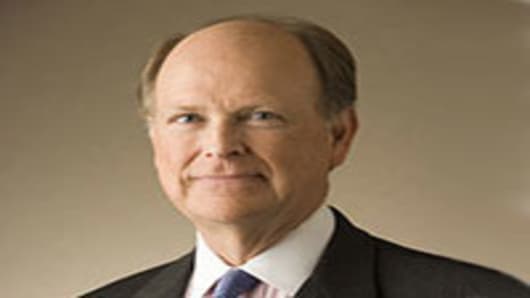To fend off inflation, the Federal Reserve probably will need to boost interest rates "sooner rather than later" even if employment and financial conditions haven't revived, the president of the Federal Reserve Bank of Philadelphia said Tuesday.
Charles Plosser is a voting member of the Federal Open Market Committee, the group including Fed Chairman Ben Bernanke that determines the direction interest rates should go to influence national economic activity.
Out of concern about inflation, the Fed in June ended a nearly yearlong string of rate reductions aimed at shoring up the wobbly economy. The Fed left its key rate at 2 percent. Many economists predict Fed policymakers will leave rates alone again when they meet next on Aug. 5.
Possessing a reputation for being extra-vigilant about inflation dangers, Plosser was one of two members who dissented from the Fed's decision in late April to slice its key rate. That turned out to be the Fed's last rate reduction, in one of its most aggressive campaigns that started last September.
"Inflation is already too high and inconsistent with our goal of -- and responsibility to ensure -- price stability," Plosser said in a speech to a group assembled by the Philadelphia Business Journal.
"We will need to reverse course -- the exact timing depends on how the economy evolves, but I anticipate the reversal will need to be started sooner rather than later," he warned. "And, I believe it will likely need to begin before either the labor market or the financial markets have completely turned around," he added.
Last week the government reported that consumer prices shot up 1.1 percent in June, the second-biggest rise in a quarter century. Wholesale prices also rose sharply during the month.
The Fed's worry is that lofty energy and food prices will spread inflation through the economy. They also worry that people, investors and companies will begin to brace for, or expect, prices to keep rising down the road. Those expectations can make them act in ways that could aggravate inflation.
"Households, workers, businesses, investors, financial firms all must have confidence that the Federal Reserve will not let inflation get out of control," Plosser said. Inflation, if not blunted by other forces, eats into paychecks, whittles the value of investments and squeezes corporate profits.
Bernanke, in back-to-back appearances on Capitol Hill last week, said he was concerned about the inflation outlook but indicated that the Fed isn't in a rush to start boosting rates given the fragile state of the economy. Housing, credit and financial problems have pounded people and businesses, causing the economy's growth to slow sharply.
The Fed, in new projections released last week, now believes inflation will be higher this year than previously thought, with prices rising as high as 4.2 percent under one inflation measure. That was up considerably from an earlier forecast of an upper bound of a 3.4 percent increase in prices.
Keeping rates too low for too long "worsens our inflation problem," Plosser said.
Critics blame former Fed Chairman Alan Greenspan for feeding the housing bubble that eventually burst by leaving rates at extraordinary low levels for too long. The Greenspan Fed in the summer of 2003 dropped its key rate to 1 percent, the lowest in more than four decades. The rate stayed there for a year before the Fed started raising rates to curb inflation.


